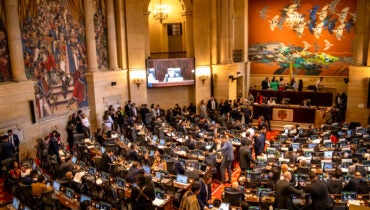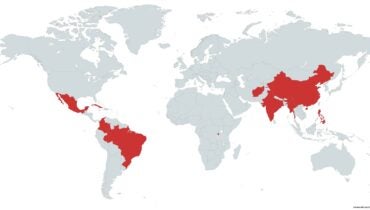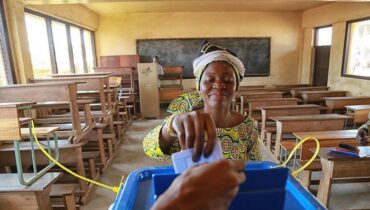The World Assembly for Women (WAW!) conference, held in Tokyo, Japan on August 28 and 29, hosts discussions centered on advancing women’s empowerment and agency on national and international levels. Japanese Prime Minister Shinzo Abe initiated this event in 2014 as part of his “womenomics” strategy, an effort to help more Japanese women enter the workforce to boost economic growth in the country. WAW! 2015 focused on the legal and normative protection of women against violence and discrimination, as well as empowerment of women and girls in the economic, political, health and social spheres of their societies. The event brought together political leaders, academic, and members of civil society to underscore the importance of empowering women. The conference provided a powerful message of inclusion, solidarity and community for women fighting for equality and the right to participate around the world.
The conference opened with speeches from Prime Minister Abe; Ellen Johnson Sirleaf, President of Liberia; Marilyn Hewson, President and CEO of Lockheed Martin; and Phumzile Mlambo-Ngucka, Executive Director of UN Women, along with video remarks from Christine Lagarde, Managing Director of the International Monetary Fund, and Nicole Kidman, Goodwill Ambassador for UN Women. The speakers shared their experiences working to advance the rights of women around the world, and they encouraged governments, civil society and individuals to support opportunities for women to take on leadership roles.
WAW! featured roundtable discussions on engaging men in working for gender equality, girls’ education, women and peacebuilding, and multi-stakeholder partnerships for international cooperation, among others. Special sessions were also held on women’s empowerment through sanitation, supporting women entrepreneurs across Asia, and gender and disaster risk reduction. The conference featured expert speakers from international organizations, national governments and international corporations, including Zainab Hawa Bangura, Under-Secretary-General and Special Representative of the UN Secretary-General on Sexual Violence in Conflict; Helen Clark, Administrator of the UN Development Programme; Rula Ghani, First Lady of Afghanistan; and Margareta Wahlström, Special Representative of the UN Secretary-General for Disaster Risk Reduction.
These roundtable discussions provided an opportunity to hear from experts, and also for experts to engage with the broader community of women’s activists. Wahlström argued that while women are leaders at every level, their leadership is not visible enough – that women’s leadership is not absent, just discreet. WAW! brought together women leaders at every level to address this lack of visibility and to encourage advancement of women in every field.
Ambassador Melanne Verveer spoke on the work-life management roundtable discussion, emphasizing reforms that can be made to help women enter and stay in the workforce. GIWPS Deputy Director Mayesha Alam and Hillary Rodham Clinton Research Fellow Briana Mawby gave a presentation on gender-responsive disaster risk reduction following the 2010 Haiti earthquake.
While these discussions covered a breadth of topics, most remarks centered on policy reform, normative reform and cultural barriers to women’s participation. International and national leaders, civil society organizations and individuals each have an important role to play in supporting women’s empowerment and leadership. Specifically, the conference focused on domestic reforms in Japan, such as improving maternity leave and flexible work options, as an invitation to the broader international community to commit to policies protecting women from violence, improving education for girls, and including women in peacebuilding and disaster risk reduction.
While WAW! covers the issues facing women worldwide and their agency in finding solutions, much of the conference focused on Japan and the ways in which it is supporting women’s empowerment and growing opportunities in the workforce. Prime Minister Abe played a central role in the proceedings, emphasizing the need to build “a society where women shine.” Helen Clark argued that women’s collaboration skills are ideal for the type of leadership necessary in today’s interconnected community, and the WAW! proceedings emphasized women’s unique abilities to lead and contribute to peaceful and sustainable communities.
WAW! is a global convening that makes a strong statement for the support of women’s empowerment, protection and inclusion at all levels of society. Women must be included at all levels and in all spheres – political, economic, health and social – for societies to grow economically, build resilience, become more peaceful and serve the needs of all people.


